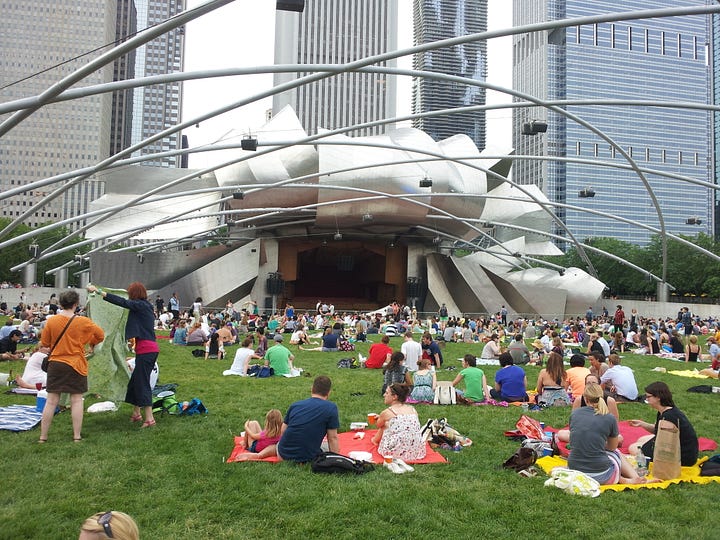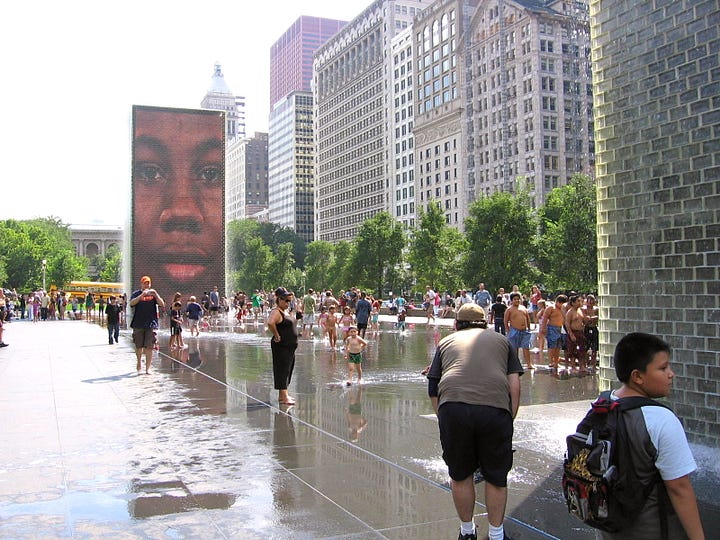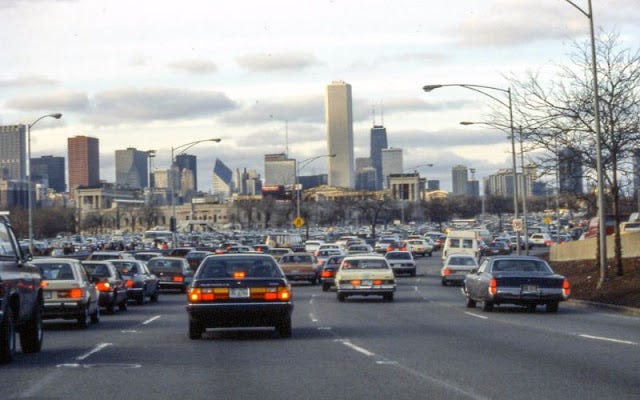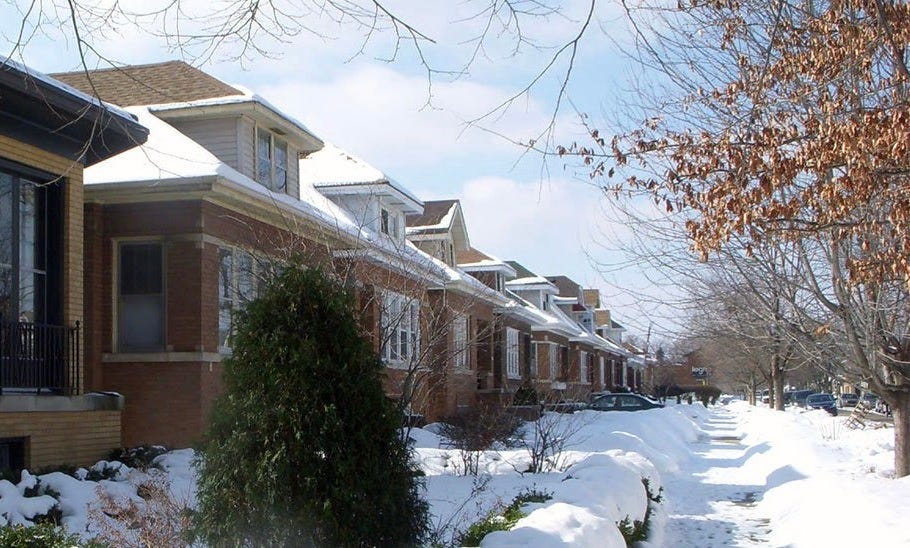It’s 6:30 or 7 in the morning and I’ve just woken up to nothing. No alarm, no siren, no traffic, not even the rain falling outside my windows. There is only silence. I lie there, my body suspended in grace. My dreams have been particularly active of late. To wake to silence is a luxury, a gift, and one that I cherish.
It was only a week or so ago that I complained about Harvard Avenue (one block over) getting too loud in the mornings. I had woken to a police siren. And then there were the motorcycles, typically around 5am, which someone explained could be airport workers heading in for the morning shift. I live seven miles from the airport and never hear planes. Thank goodness.
I have always been anemic to noise and sensitive to sound. Back in the days when I actually went to movie theatres, it wasn’t uncommon for me to leave my seat and ask someone at the popcorn stand if they could have the sound lowered. Music is only on in my home when I am listening to it. When I can listen to it. I’ve never kept it on in the background just to have it on. Same goes for the radio, the TV, or even these days, podcasts. None of my dogs have been barkers. Maybe I’ve been lucky or maybe I trained them out of it – I honestly can’t say. But when I once had a neighbor whose dogs barked incessantly, I called animal control.
The sound of waves is predominantly calming. As is the sound of falling rain. As a massage therapist, I often played these and other nature sounds instead of music to help clients relax. In the 1990s, small fountains in the home and white noise machines in the bedroom were popular. I could bear neither. In almost all situations, my preferred sound is silence.
I’ve often joked that I gave up the saxophone in high school because I couldn’t stand going to football games. Only now do I consider it was the noise of the games that bothered me. The band, the cheerleaders, the announcer, and the crowds. Too much energy, too many stimuli.
I was fortunate to have a seat at the 1999 FIFA Women's World Cup game played at the Rose Bowl in Pasadena, along with 90,000+ spectators—the largest crowd in history at a woman’s sporting event. I saw the winning goal and Mia Hamm spontaneously whip off her shirt to celebrate in her sports bra. But honestly, I almost missed it. I could tolerate the obnoxious and loud men in the seats behind us no longer and had left to stand in that alcove where you enter the stands. I turned to watch just as the ball whizzed past the Chinese team goalie and the crowd was on its feet. Yes, that was cool. Very, very, cool. But it came with tremendous irritation and anxiety leading up to that win. Now I never need to see another large sports game again.
It’s true that I’m a WASP and I grew up in a quiet household. Mine was a family of five with extended family living in other towns. We rarely had large gatherings or raised our voices. Church was an ordered affair and never peppered with spontaneous bursts of emotion or enthusiastic AMEN!s. When I took my father to a White Sox game with the tickets I was awarded for good grades at age 10, he brought a book. A few years later when my eighth grade class went to see the Chicago Cubs, I did the same. So yes, much of this behavior was learned. But on the other hand, my parents were not introverts. They were animated people who told great stories and my father had a booming laugh. I, too, have never been considered a quiet wallflower. Still, the sounds and stimuli that are taken for granted by others are very often too much for me.
In all seriousness, I wonder if I have a condition. Agitation and anxiety caused by noise and crowds – is there a diagnosis for this? Is my response abnormal? Are healthy people okay with cheering and shouts? Can normal folks just tune out city sounds?
While luxuriating in the silence around me this morning, I opened my phone and saw an article from The Atlantic: Why Do Rich People Love Quiet?: The sound of gentrification is silence by Xochitl Gonzalez. I don’t have a subscription to The Atlantic and trial-free periods bug me because then I need to remember to cancel before being charged, so I didn’t read this article from September 2022. (If you have a subscription and want to forward it to me, however, I’d be grateful.) But it certainly got me thinking.
Is my relationship with quiet a need or is it a privilege of my socioeconomic status?

In my doctoral dissertation on the psychology of home, I reference Yi-Fu Tuan in his book, Space and Place: The Perspective of Experience, where he describes how economic status interlaces with housing preferences. He writes:
In Western industrial society, working-class families are known to tolerate a much higher residential density than do middle-class families. And the reason is not simply because workers have little choice. Proximity to others is desired. Suburban retreats, each sitting on its own half-acre of lawn, are not necessarily the envy of working-class families accustomed to the bustle and color of an older neighborhood. Such families view the middle-class suburb with suspicion; it seems cold and exposed. Human proximity, human contact, and an almost constant background of human noises are tolerated, even welcomed.
Even as I was writing my dissertation, I found this assessment to be too broad, too stereotypical, and even insulting somehow. I could find no evidence to support Tuan’s assertion. There is certainly an aspect of his theory that relates to mine about childhood imprints, however. Meaning, the circumstances around positive experiences when we’re young make such a strong impression on us that we then, as adults, associate these same circumstances with a positive or comfortable connection to home. But there is a huge gap between what Tuan describes as suburban living (a half-acre of lawn in a middle-class suburb?) and “an almost constant background of human noises” in working-class neighborhoods. Written almost fifty years ago, I’m not sure about these descriptions but I’m pretty sure we still had a bevy of ethnic neighborhoods. Generations of immigrants that were hunkered down in the same place to relieve some of their homesickness. But today, very few neighborhoods are defined by ethnicity and every middle-class neighborhood is also working-class. Homes with half-acre lawns are reserved for the rich or for those living rurally, and the latter is often a hand-to-mouth existence.
I spent sixteen years as a child in Chicago. Nine of those were in the very working-class neighborhood of Bridgeport, just blocks from Comisky Park. A place that was often referred to as “the white ghetto,” though I’m not sure how accurate that was. The other seven were on the northwest side where small brick bungalows lined every street. This was what middle class looked like in the ‘70s and ’80s. Then I spent the years between ages 18 and 24 in San Francisco and San Diego. These were cities just as dynamic as Chicago: buses and bikes, construction and traffic jams, tar trucks and smoke, concrete playgrounds, and a proliferation of bustling commercial streets. But up through age 16, I also spent a few weeks of my summers on a farm, outside of a very small town. I’ve always thought those weeks are what saved me.

There’s something about decency, kindness, and consideration of others in this mix. All those years of living in cities when I was young and I don’t remember being bothered by noise. There were no cars blasting music with the windows rolled down. No dogs barking incessantly. No pick-up trucks roaring their engines. Motorcycles were a bit of a rarity. The only sound I truly remember is horns honking. But perhaps my memory fails me. Perhaps my sensitivity has increased and my tolerance no longer exists.
I check Reddit for feedback on The Atlantic article and discover comments at odds with the writer’s theory. “I’m poor and love silence” resonates the most with me. And then there is what seems like a bulls-eye: “Everyone wants some peace when going to sleep or resting from work. The only difference is that rich people can pay for it”.
What do you think? Is our relationship with silence and noise a product of our socioeconomic status, a predilection, a peculiarity, or something else?







Unique. I’ll take it!
Hey did you attend the Black & Blue concert in 1980? Black Sabbath and Blue Öyster Cult. I was there. Pink Floyd, Led Zeppelin, REO Speedwagon, Rush, and my favorite, the scorpions. Those were my high school soundtracks. 😁
Jan, this is such a brilliantly written and thought provoking piece! Silence for me as well has been an absolutely necessity, and I could resonate with what you have written.